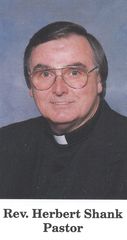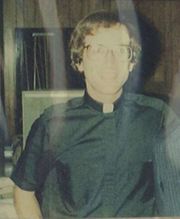Is a Priest Accused of Abuse One of Your Neighbors? It's up to You to Find Out.
By Brandie Kessler
“Just because somebody’s accused, you could have accused somebody of anything,” Worley said. “In this case, I think this guy should definitely be on a list somewhere.” Shank, who did not answer his door on several occasions and who could not be reached for comment, is accused of molesting multiple children. Several victims contacted the Diocese of Harrisburg years ago to say Shank molested them, according to the report. One said Shank showed him a box full of half-naked photos of other boys his age. Another, who was in the sixth grade and acting as an altar boy when he met Shank, said the priest molested him between 1971 and 1974. Initially, the victim said, Shank took him and other boys to drive-in movies, swimming and on field trips to other states. That led to Shank taking him to different places alone, and eventually to the boy being sexually abused by Shank, which the priest sometimes photographed. In 1995, the Diocese of Harrisburg turned over “photographic negatives and videotape cassettes,” to the York County District Attorney’s Office, according to the grand jury report. Shank, who at one point served at St. Rose of Lima in York, was never charged, and it’s unclear what investigation, if any, was done. The York County District Attorney’s office said recently it does not have any photographic or videographic evidence, and it appears likely any evidence has been destroyed. Worley said she cannot grasp why no charges were filed if there was evidence decades ago. “The police have video evidence provided to them by the diocese … of a priest assaulting children, and they didn’t do squat about it?” she said. “Those poor kids. That’s just horrible to me.” Limitations of Megan’s Law Megan’s Law, which is a federal law that requires the reporting of certain information about sex offenders, is one tool that can enhance public safety, said Cpl. Adam Reed, a public information officer with the Pennsylvania State Police. The Megan’s Law website allows a user to search for convicted offenders near their home or workplace, and users can sign up to be notified when there are updates on people in their area “almost in real time as these offenders are processed,” Reed said. “It’s for the public to use to really keep tabs on these folks.” One of the limitations of Megan’s Law is that it only applies to people who have been convicted of sex offenses, like unlawful contact with a minor, rape, kidnapping, etc., Reed said. “It’s nobody who has charges pending.” It also doesn’t apply to those who have admitted to such offenses, much like many of the priests named in the grand jury report, but who cannot be charged because the statute of limitations on the offenses has expired. The priests named in the report who are still alive have not been passed on to other parishes, Harrisburg diocese spokesman Joe Aponick said. The diocese does “keep track of where they are and make that information available to law enforcement." But Reed said he was unfamiliar with state police having been notified of any such priests who live in the jurisdictions state police cover. Conewago Township, Adams County, Police Chief Curtis A. McCoy also has not been notified about priests in his area from the diocese, or anyone else, he said. Shank lives in his jurisdiction. Others offenders have gone unnoticed Robert Martin, director of public safety in Susquehanna Township, Dauphin County, where at least one other accused priest named in the grand jury report lives, said he doesn’t recall his department ever being notified by the Harrisburg diocese. Guy Marsico, lives in the 1900 block of Daybreak Circle, in a town home community in Susquehanna Township, just outside of Harrisburg.
Marsico, whose name appears on pages 152 and 559-560 of the state report, testified before the grand jury in November 2016, and “confessed to molesting children.” After the Harrisburg diocese released a list on Aug. 1 of dozens of priests, including Marsico, accused of abuse, but before the grand jury report was made public on Aug. 14, several neighbors in his neighborhood were unaware of the allegations against him. Marsico was also named by the York Daily Record in August 2016 as one of 15 priests accused of abuse who had a connection to the Harrisburg diocese. One of his neighbors, who did not want to be named, has several children. She said she had known Marsico on a neighborly basis for years, and he seemed to be a nice old man. She didn’t want to say anything more about him without knowing more. Attempts to reach Marsico have been unsuccessful. He did not answer his door and did not return several phone calls. A bigger danger to children Kristen Houser, chief public affairs officer for the Pennsylvania Coalition Against Rape, said it’s important for the community to know about offenders in their communities, and so naming priests like Marsico and Shank can be helpful. But listing offenders is not going to solve the problem of childhood sexual abuse or sexual violence as a whole, she said. “The vast majority of people who are perpetrating sex crimes are not on Megan’s Law and never will be,” Houser said. That’s because sex crimes are often unreported, and the statute of limitations renders many cases unprosecutable by the time they are reported. Since Megan’s Law is only for people who have been convicted, by the time those people end up on a list they’ve already done harm, Houser said. Her goal is to prevent sexual violence, which can’t be done by relying on a list. “We have an over reliance of thinking that list is there to keep us safe,” Houser said. “That list is one tool to keep us safe. … If we are depending on the sex offender registry to keep our neighborhoods safe, then we are going to fail.” Houser supports abolishing the statutes of limitations for civil and criminal cases of sex crimes, and adopting a retroactive window for civil cases. But even that isn’t going to stop sexual violence against children, she said. “If we want to be serious about ending sexual assault and protecting each other, we have to think bigger,” she said. “We have to get comfortable about learning about things that make us uncomfortable.” We have to recognize the bigger danger to our children is the person who already has our trust -- whether a family member, a friend of the family or a caregiver like a coach or teacher -- and whom our children trust, who are grooming children for sexual abuse or are already sexually abusing them, Houser said. “We have to stop saying ‘John wouldn’t do that. Mary wouldn’t do that,’” Houser said. “John and Mary do do that, that’s how you end up with a grand jury report.” Instead, we have to get comfortable talking to our children in age-appropriate ways, about sexual violence. We have to know where our children are and with whom, and ensure they aren’t in situations that would allow them to be violated, and if such a situation arises, we need to disrupt that, Houser said. We need to hold our schools and youth organizations accountable for their policies and practices that could leave children at risk. The last thing Houser wants people to do, is use the list of names provided in the grand jury report or those offenders listed by Megan’s Law to give them a false sense of security. The people who are listed are the “low-risk category,” Houser said. “You don’t want to go through life paranoid,” she said, but you also can’t go through life with blinders on. “The reality is this stuff happens, and it happens close to home.” An ethical obligation After Worley learned her neighbor has been accused of molesting children, she called her real estate agent and her property manager. She needs the income the rental property is supposed to bring, but she acknowledged what she said was her ethical obligation to notify any potential tenants, especially those with children, about who lives nearby. "I'm the mother of three boys, and that is really the basis for a lot of this," Worley said. "I would never have moved my kids into a house across the street from somebody like this guy, and I don't feel comfortable being responsible for somebody else doing it either." She said she plans to tell any potential tenant whatever she legally can about her neighbor, so they can be informed if they decide to rent from her. "I would never be able to forgive myself if I didn't say something, somebody moved in with young boys and something happened to one of them," Worley said. "Nothing else matters more than our children. They're our most precious thing." Reporter Candy Woodall contributed reporting.
|
.
Any original material on these pages is copyright © BishopAccountability.org 2004. Reproduce freely with attribution.

